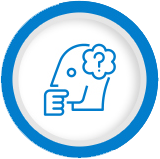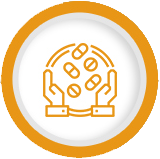Opiates & Mental Health
What Are Opiates?
Opiates are psychoactive drugs naturally derived from the opium poppy. They are narcotics that act as Central Nervous System depressants. Drugs that fall in this class are very effective for treating pain. Doctors prescribe Opiates to patients suffering from chronic pain and various diseases.
Opiates work by inhibiting pain receptors in the brain in order to reduce sensations of aches and discomfort. Their mechanism of action can also induce feelings of relaxation and euphoria. This is one of the main reasons they’re highly addictive.
The term ‘opiates’ commonly refers to natural modified components of opium such as codeine and morphine. Opioids is the general term used for the entire class of drugs that includes both opiates and synthetic opiates, like Fentanyl and Oxycontin.
The sense of wellbeing and euphoria induced by opioids make these class of drugs highly addictive. People may start taking these drugs under prescription, but use can easily spiral into dependence and addiction. While addiction to opioids in and of itself is a medical condition, it can occur alongside other mental problems, exacerbate psychological issues of directly cause some mental disorders.


Types of Opiates & Their Effect on Mental Health?
Opioids are prescribed for a broad range of medical conditions. There are three main types of opioids:
1. Natural Opiates: These are chemical compounds that can be extracted from the opium poppy. They include codeine and morphine.
2. Man made/synthetic opioids: This class of drugs are synthesized from natural opiates in laboratories. They include hydrocodone, oxycodone, and hydromorphone. Heroin is also a semi-synthetic opioid since it’s made from morphine.
3. Fully synthetic opioids: These opioids are completely manmade. They include Fentanyl, methadone, and levorphanol among others.
People abuse opioids because of the ‘high’ they induce. Taken overtime, tolerance can set in, where the brain requires more of the substance to maintain homeostasis. This leads to increased dosages and often results in overdose, which can cause death.
Opioids are responsible for different chemical reactions in the brain that can cause a series of mental health effects. Abusing opioids over a long period can lead to depression and worsen other mental health issues that may have been present before use.
Research has also found that people with certain mental health issues face a higher risk of becoming addicted to Opioids. This is becausethe drugs are often used to alleviate mental suffering and induce euphoria.
- none Easy
- none Confidential
- none Lifetime Support
The Opioid Epidemic
The US began to suffer an opioid crisis in the 1990s and its still a problem today. Reports now show there’s a worrying rise in opioid prescriptions and deaths in the UK. According to the Office for National Statistics, there has been a 29% increase in the number of deaths linked to fentanyl, a drug considered by some 100 times more powerful than Heroin.
Over the last decade, the number of Opioid prescriptions in England alone has nearly dou-bled. This means more people are at risk of becoming dependent and addicted to these drugs.
While the cause of increasing opioid prescriptions may be linked to more people living with chronic pain and an ageing population, it also speaks to an imminent danger that can cause a wide range of societal problems.
Though the UK isn’t suffering as much of a crisis as the US, experts are worried there’s a looming Opioid crisis that needs to be averted. Cases of overdose and deaths linked to this class of drug continue to rise.
Figures show that 2,000 people die each year as a result of Opioid abuse. This means more than five people die every day in the UK. A 41% increase from ten years ago.


Opiates’s Benefits & Risks for Mental Health
When taken strictly under prescription and for a short period of time, opiates are helpful in treating a wide range of medical problems.They are beneficial to people suffering from chronic pain due to conditions like cancer and other illnesses that may not respond to other medications. They are also used to reduce pain after surgical procedures.
It’s important that you don’t discontinue your use of the drug you’re prescribed or increase your dose without consulting your doctor. It’s never recommended to start an opioid medi¬cation without a doctor’s prescription.
There are mental health risks associated with taking opioids. People suffering from a pre-existing mental health issue should be wary of taking this class of drugs. This is be¬cause, while it may quell mental health symptoms at first, continued use is a recipe for ad¬diction and the health issues will likely worsen overtime. The mental health damage caused by abuse of the opiates may take years to fully reverse.
The presence of a mental health issue and an addiction to opioids is known as a dual diag-nosis or comorbidity. The condition is approached through special treatment where both co-occurring disorders are treated simultaneously by a trained specialist
Opiates & Depression
Experts have found that opioid abuse and depression have a bi-directional relationship. This means that suffering from one condition can increase the risk of the other.
Most people suffering from a chronic pain condition also suffer from depression. This means depression is frequently present before opioid use begins.
Opioid abuse has also been linked to higher rates of depression and anxiety due to changes the drugs causein the brain. The chemical binds itself to the opiate receptors across the brain and body in order to cause lulling effects and remove pain sensations. As more neurochemical activities are inhibited due to the activity of Opiates, psychological problems worsen.
A study in the US found that 10% of more than 100,000 patients who were prescribed opioids developed depression after using the medication for a month. These patients were not diagnosed with depression before the study began.
Depression also increases the Ask of opioid addiction. Researchers suggest that opioids are not very effective in treating depression and may lead to a patient taking increased doses to get results. This can, in turn, lead to tolerance and addiction. As a result, it’s now recommended that patients are screened for depression before they’re placed on any opioid medication.

Addiction is a devastating illness which can put all your relationships and your career in chaos. To help you recover and enjoy life again, we strive to heal both you and your relationships. Call us now to begin the road to recovery today!
Get Help Immediatley, Call Now!

Opiates & Trauma
Often people self-medicate with opiates because it relieves their suffering. Many people suffering from trauma, especially Post Traumatic Stress Disorder (PTSD), turn to opiates as a coping mechanism. This can spiral to addiction.
Taking any Opiate over a long period causes the brain to adjust its neurochemical balance and depend on the drug for normal function. This triggers the onset of withdrawal when use is discontinued, interrupted, or significantly reduced.
Withdrawal results in a pattern of uncomfortable and potentially life-threatening health symptoms that can force a patient to return to opiate use or increase their dosage.
Researchers suggest that the mechanism of reinforcement and reward stimulated by mor¬phine is enhanced by the recall of traumatic memories. The link between PTSD and opioid use disorder has been traced to dopamine receptors. These receptors play a role in both addiction vulnerability and traumatic memory.
People suffering from other forms of trauma like sexual assault, domestic violence, or trau¬matic loss, can also be motivated to abuse opioid pain killers in order to escape their mental ordeal. While this relief comes with the risk of addiction, it can also worsen mental problems and lead to other issues, like clinical depression.Opiates do not interact well with mental disorders. They can cause long-lasting effects that can be difficult to recover from.
Opiates & Addiction
A vast number of substance-related disorders fall under opiate addiction. Addiction to opi-ates can start from a legitimate prescription and normal course of treatment. Opiates are a highlyaddictive class of drugs. In other cases, opiates are abused to quell a mental health issue or simply for recreational purposes.
Opiate addiction is characterised by a compulsive use of a painkiller like morphine even when the dangers of abuse are known.
Opioids travel through the bloodstream and attach to the opioid receptors found in the different locations of the brain, gastrointestinal tract, spinal cord, as well as other parts of the body. This results in the reduction of pain perception and can also induce euphoric highs.
The brain’s reward system is thus affected, and addicts develop a compulsive urge to expe-rience these feelings repeatedly. Continued use of opioids causes the body to reduce its production of naturally occurring chemicals like dopamine and endorphins. This leads to dependence on opiates for the production of these chemicals.
Overtime, the body will be desensitised of the effects of the drug. This is known as toler¬ance. At this stage, higher doses of the drug will be required to induce feelings that were once enjoyed at relatively lower doses. Addiction is close at this point. As the behaviour continues, people begin to suffer from a withdrawal syndrome whenever they reduce their dose or discontinue use of the drug.


Opiates & Social Responsibility
Abusing Opiates can have a huge impact in every aspect of your life. Your compulsive need to use the drug may cause you to place it above other life priorities. This can lead to impaired relationships, unemployment, and even homelessness.
Opiate abuse results in a lot of physical and emotional problems. The opioid receptors in the body will continue to suffer a damaging decline and, in the long run, it may become difficult to experience normal emotional feelings.
Abusing opiates also comes with cognitive consequences. When the brain’s chemistry is altered, all sorts of things go wrong. Your reflexes may be slowed, and you may find it difficult to perform day-to-day tasks. This puts you at risk of accidents when driving and operating heavy machinery.
The slowed reactions, confusion, and generalised impaired cognitive function can manifest as long-term withdrawal symptoms. The impact of long-term opiate abuse can last for years after the last dose. If you have been addicted for a long period of time, you may suffer a lack of concentration and slowed responses years after quitting.
Some people going through recovery admit they never feel like their former selves even after quitting. Magnetic resonance Imaging (MRI) scans haveshown brain irregularities linked to heroin even after three years of sobriety.
While recovering from Opiates might be a slow and long process, you can be coached on coping techniques to help you lead a healthy life. This is why it’s crucial that you seek treatment for your opiate addiction. Treatment is the best route to sustainable recovery. After treatment, you can further enhance your lifestyle by getting help through self-help groups and other community programmes close to you.
On completing treatment we offer lifetime support for your recovery.
Strict client confidentiality policy is in place.
Simply give us a call and we will guide you through the process.
FAQ
What is opiate replacement therapy?
Also called opioid substitution therapy, this is a treatment technique where an opioid, like heroin, is substituted with a longer-lasting opioid medication like buprenorphine. The therapy is considered an alternative to detox and is used to reduce the risk of overdose.
Can opioid pain management lead to addiction?
If you take opioids under strict medical guidance, you have a significantly lower risk of becoming addicted. However, the risk of addiction will still be present. The effects of the drug on your brain can easily lead you to increase your dosage or take the drug longer then recommended
How widespread is opioid addiction in the UK?
Opioid addiction in the UK is increasing. Figures show that an estimated 5 people die each day as a result of Opioid abuse. Prescriptions of Opioids and purchase of illicit opiates are rising at an alarming rate and experts are concerned of a looming epidemic.
Is there treatment for opiate addiction near me?
Yes. There are professional treatment centres scattered across the UK where you can receive help.
What is opioid induced psychosis?
Opioids abuse can trigger psychotic symptoms that mimic dangerous mental and behavioural disorders. Psychosis is a condition characterised by hallucinations and delusions and is normally associated with mental illness. Opioid induced psychosis is linked with hospitalisation, suicidal thinking, and highlyrisky behaviours.





